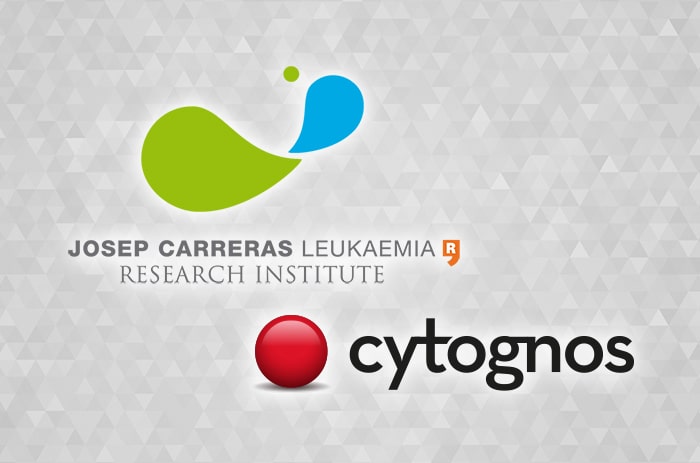The Josep Carreras Research Institute and Cytognos S.L. develop a kit to determine the prognosis of patients diagnosed with Acute Myeloid Leukaemia

The Joint Cytometry Unit, formed by the Josep Carreras Leukemia Research Institute and the company Cytognos S.L., has developed a new commercial reagent that helps determine the prognosis of patients with Acute Myeloid Leukemia at the time of diagnosis.
Acute Myeloid Leukemia (AML) is a very aggressive type of hematological cancer caused by the abnormal proliferation of myeloid stem cells (myeloblasts). AML initially manifests itself in the bone marrow but can rapidly spread to the blood and sometimes affects other parts of the body. It is the most common hematologic cancer in adults and is associated with a low probability of recovery and a relatively high early mortality rate.
Investigating AML is a complex task, due to the clonal heterogeneity of the pathological population (there is great variation both among the malignant cells of the same patient and among different patients). Therefore, any advance that allows prediction of disease progression is of paramount importance to offer a better and personalized response to the treatment plan of each individual.
The Functional Cytomics Group of the Josep Carreras Leukemia Research Institute, led by Dr. Jordi Petriz, has shown that higher cellular alkaline phosphatase activity in leukemic myeloid precursors is significantly associated with a higher risk of relapse or resistance to treatment and mortality (Rico, et al. 2019). Based on this research and under license from the Josep Carreras Institute, Cytognos S.L. has developed a commercial kit, which is available under the name APLS-AML (Alkaline Phosphatase Live Stain-Acute Myeloid Leukemia). The kit uses a 4-colour antibody combination and should be used together with the profluorescent substrate of the alkaline phosphatase enzyme.
The kit is based on methodologies developed at the Josep Carreras Institute that allow the minimum manipulation of the sample, combining functional analysis and cellular immunophenotyping to evaluate the enzymatic activity in leukemic cells.
The Josep Carreras Institute and Cytognos S.L. are both convinced that the joint efforts of the two institutions, which are already bearing fruit, will boost technology and knowledge about hematological cancers, contributing significantly to the diagnosis and treatment of these diseases.

Desde la Unidad Mixta de Citometría, formada por el Instituto de Investigación contra la Leucemia Josep Carreras y la empresa Cytognos S.L., se ha desarrollado un nuevo reactivo comercial que contribuye a determinar el pronóstico de pacientes con Leucemia Mieloide Aguda en el momento del diagnóstico.
La Leucemia Mieloide Aguda (LMA) es un tipo de cáncer hematológico muy agresivo que se debe a la proliferación anormal de las células madre de origen mieloide (mieloblastos). La LMA se manifiesta inicialmente en la médula ósea, pero se puede extender rápidamente a la sangre y, en ocasiones, llega a afectar otras partes del organismo. Es el cáncer hematológico más frecuente en adultos y se asocia a una baja probabilidad de recuperación y a una tasa de mortalidad precoz relativamente alta.
Investigar la LMA supone una tarea compleja, debido a la heterogeneidad clonal de la población patológica, es decir, a las grandes diferencias existentes tanto entre las células malignas de un mismo paciente, como entre distintos pacientes. Por eso, cualquier avance que permita predecir la evolución de la enfermedad es de capital importancia para ofrecer una mejor respuesta al plan de tratamiento de cada individuo, de forma personalizada.
El Grupo de Citómica Funcional del Instituto de Investigación contra la Leucemia Josep Carreras, liderado por el Dr. Jordi Petriz, ha demostrado que una mayor actividad de la fosfatasa alcalina celular en los precursores mieloides leucémicos se asocia significativamente con un mayor riesgo de recaída o resistencia al tratamiento y mortalidad (Rico, et al. 2019). Basándose en esta investigación y bajo licencia del Instituto Josep Carreras, Cytognos S.L. ha desarrollado un kit comercial, disponible bajo el nombre de APLS-AML (Alkaline Phosphatase Live Stain-Acute Myeloid Leukemia), que utiliza una combinación de anticuerpos de 4 colores, que debe usarse conjuntamente con el sustrato profluorescente de la enzima fosfatasa alcalina.
El kit se fundamenta en métodos desarrollados en el Instituto Josep Carreras que permiten la mínima manipulación posible de la muestra, combinando el análisis funcional y el inmunofenotipado celular para evaluar dicha actividad enzimática en las células leucémicas.
Tanto desde el Instituto Josep Carreras como desde Cytognos S.L., estamos convencidos que los esfuerzos comunes entre ambas instituciones, que ya están dando sus frutos, impulsarán la tecnología y el conocimiento sobre los cánceres hematológicos, contribuyendo significativamente al diagnóstico y tratamiento de estas enfermedades.

